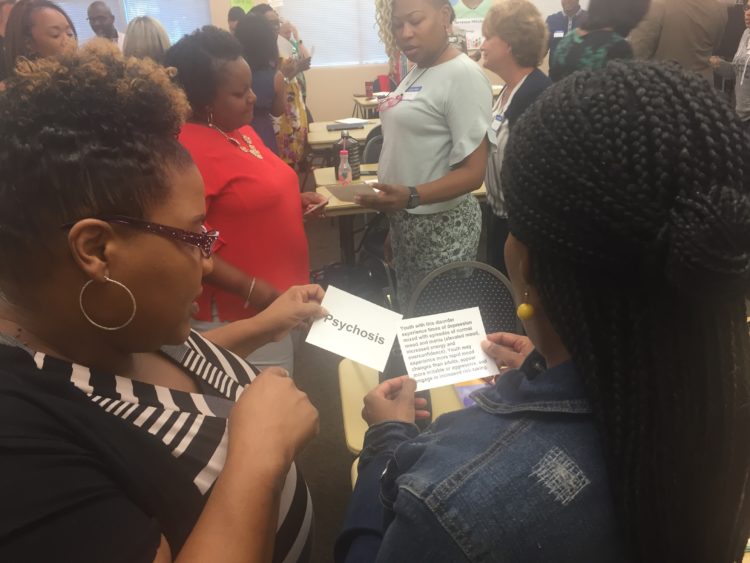July 2, 2019 – “As an educator, every single day, you will encounter a mental health illness in your students.”
This is a truth that Katrina Taylor, School Behavioral Health Director, wants all educators to know – and a statement she emphasized repeatedly on Tuesday, July 2 to the more than 20 Duval County Public Schools’ educators going through the district’s Youth Mental Health First Aid Training.
The training has been offered to district educators since the 2014-15 school year. Through candid discussions, interactive activities, videos and role-playing, the training teaches educators how to recognize and address mental health concerns in students including depression, anxiety, eating disorders, substance abuse disorders and suicidal thoughts.
“Mental illness impacts one in five people,” said Taylor. “So our educators have to be knowledgeable about what the signs and the symptoms are so they can provide the assistance.”
One of the activities in Tuesday’s training involved participants simulating a conversation between an adult and a child who is experiencing delusional thinking or hallucinations. Several of the participants said the activity gave them a new perspective.
“I couldn’t focus,” said one of the participants.
“It was almost like you’d do anything to get it (the voices) to stop,” said another.
Aaron Lakatos, assistant principal at Sandalwood High School, was one of the participants in Tuesday’s training. A 15-year educator, Lakatos said trainings like these are essential for educators.
“Mental health awareness is the most important piece when you’re talking about the whole child,” said Lakatos. “You can’t teach them until you reach them. We need to focus on the root of the problem and help children both in and out of the classroom.”
He said that one of his takeaways from the training was how important it was to listen and to pay attention, particularly because children are not always capable of expressing themselves or asking for help.
“In the end, educators are the front line,” said Lakatos.
Taylor says the training does not turn educators into licensed mental health counselors or experts. Rather, it provides them a foundation in mental health literacy. Among some of the strategies they learn in responding to a mental health concern is the ALGEE action plan. It consists of:
-
Assessing the risk of suicide or harm.
-
Listening non-judgmentally.
-
Giving reassurance and information.
-
Encouraging appropriate professional help.
-
Encouraging self-help and other support strategies.
Approximately 260 educators will participate in one of the 13 trainings offered this summer. Training is available throughout the year. Taylor said the goal is to have 100 percent of school-based educators – principals, assistant principals, deans, teachers, counselors, etc – participate in the training.
Visit here to learn more about Youth Mental Health First Aid training.








